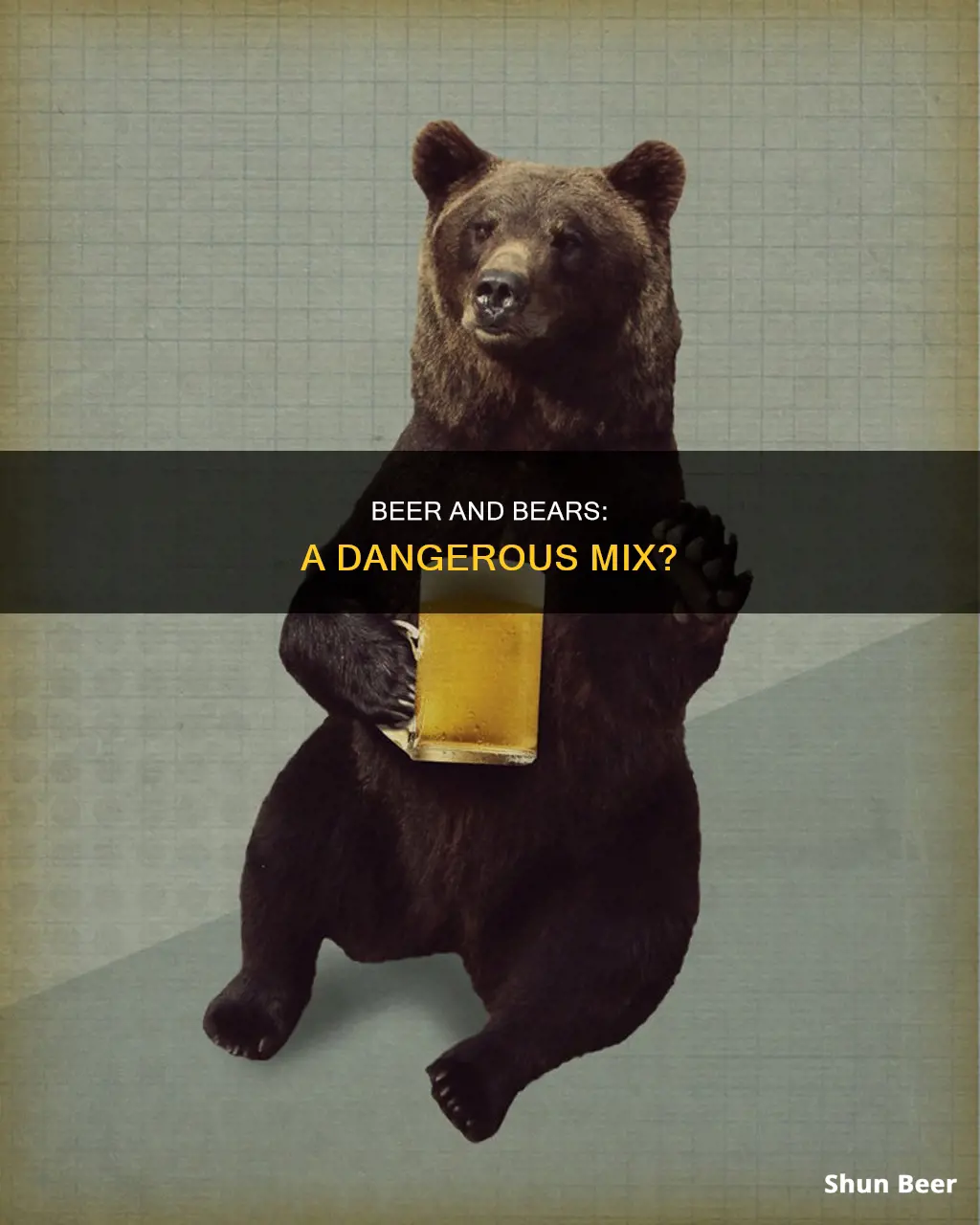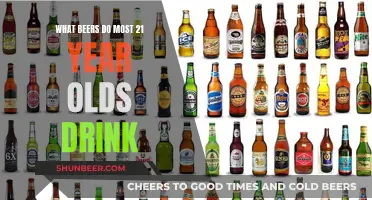
It is not uncommon for bears to be attracted to alcoholic drinks. In fact, there have been several instances of bears drinking beer, with one particular incident involving a black bear that was found passed out on a lawn after drinking 36 beers. While it is not common, there are accounts of bears drinking alcohol. Bears have been known to bite into beer cans and get attracted to the odor of open beer.
What You'll Learn

Bears have been known to drink beer, sometimes to excess
Bears have been known to drink beer, and sometimes to excess. In one incident, a black bear was found passed out on the lawn of the Swift Creek Campground in the Mt. Baker-Snoqualmie National Forest. The bear had drunk a 36-pack of beers, which he stole from campers. The bear was so intoxicated that he couldn't walk straight and climbed a tree to take a nap. This is not an isolated incident, and there are several reports of bears getting drunk on alcohol.
Bears are attracted to the smell of open beer, and they have been observed biting into closed aluminum cans, having learned that they often contain food or liquid. Beer is not the only human food or drink that attracts bears. They are also drawn to other odours, such as toiletries, and will investigate any unusual scents. This can include canned goods, bottles, drinks, soaps, cosmetics, trash, and fuel.
In the case of the black bear in the Mt. Baker-Snoqualmie National Forest, the bear showed a clear preference for a specific type of beer, Rainier Beer. He drank 36 cans of Rainier and only tried one other brand, Busch Beer, which he did not seem to like. When the bear returned to the campground the next day, park rangers successfully lured him into a trap using donuts, honey, and two open cans of Rainier Beer.
While it is uncommon, there are documented cases of bears drinking alcohol. Bears have been known to get drunk on fermented apples, and there are reports of bears in Michigan getting intoxicated in abandoned apple orchards. In addition to beer and apples, bears have also been known to drink other types of alcohol, such as whiskey and wine.
When camping or spending time in bear country, it is essential to take precautions to avoid attracting bears. This includes properly storing food and drinks, disposing of trash, and keeping the campsite clean and free of odours that may attract bears.
Beer and Nasal Spray: A Safe Mix?
You may want to see also

Bears can get drunk on fermented apples
Bears are attracted to the smell of beer and have been known to drink it. In one instance, a black bear was found passed out at a campsite, surrounded by a trail of empty beer cans. However, it is important to note that beer is not the only beverage that can attract these curious creatures.
Bears have a sweet tooth and are drawn to fruits like apples, especially when they are fermenting. Fermentation occurs when apples fall from trees and begin to rot, a process by which sugars are converted into alcohol. While it is unclear if the alcohol content in fermented apples is sufficient to cause intoxication in bears, there have been several reports of bears appearing drunk after consuming them.
For example, in Port Coquitlam, British Columbia, a 500-pound black bear allegedly got drunk on fermented apples and went on a rampage. Similarly, in Lyons, Colorado, a bear was found intoxicated and wobbling around a neighbourhood, presumably also from eating fermented apples. These anecdotes suggest that while bears may not get drunk from fallen apples alone, the alcohol could be a contributing factor to their behaviour.
Additionally, the amount of fruit consumed may play a role. Darrell Smith, a wildlife biologist, suggests that a 75-pound bear would need to eat hundreds of apples at their peak fermentation to feel any effects. Therefore, while it is unlikely that a bear would eat enough apples to get drunk, it is not impossible.
Beer Drinking in Ads: Legal or Not?
You may want to see also

Beer is no different than food to bears
Bears that are accustomed to human presence have also been observed biting into closed aluminium cans, as they have learned that these often contain food or drinks. Therefore, it is essential to follow proper bear-safety guidelines when camping or spending time in bear country. This includes choosing a clean, open campsite away from trails and streams, and maintaining a distance of at least 100 feet from tents when cooking or drinking. Additionally, using a bear barrel or building a food cache is recommended to securely store all edible items, including alcohol.
It is worth noting that while bears drinking beer may seem amusing, it can have dangerous consequences. In one incident, a black bear was found passed out on the lawn of a campground due to consuming a large quantity of beer. The bear had stumbled into a campsite and helped itself to the campers' cooler, drinking around 36 cans of beer. This resulted in the bear becoming intoxicated to the point of unconsciousness. While this particular bear was safely relocated by wildlife officials, it is important to remember that encounters like these can pose risks to both bears and humans.
Therefore, it is crucial to practice responsible camping and drinking habits in bear country. This includes properly securing all food and beverages, including alcohol, and disposing of trash appropriately. By following these precautions, we can minimise the chances of bears accessing human food and drinks, including beer, and reduce potential conflicts between humans and these wild animals.
Drinking Beer at Anfield: What's the Deal?
You may want to see also

Bears have a strong sense of smell
Bears are known for their exceptional sense of smell. Their olfactory abilities are considered the best among all animals on Earth. The average dog's sense of smell is about 100 times better than a human's, and a bloodhound, which is one of the best tracking dogs, is 300 times better. However, a bear's sense of smell is seven times better than a bloodhound's. This means that bears can smell approximately 2,100 times better than humans.
The power of a bear's sense of smell lies in its complex and specialized nose structure. Bears have larger and more convoluted noses than humans, which means they have more nasal tissue, scent receptors, and a higher surface area available for detecting scents. The convoluted structure increases the likelihood that air passing through the nasal passages will come into contact with scent molecules. The size of a bear's olfactory bulb, which processes scent information, is also larger than that of other animals, indicating that a significant portion of their brain is dedicated to processing smells.
A black bear's sense of smell is so strong that it can easily be measured in miles. Conservative estimates state that they can smell a food source from over a mile away, while other sources claim they can smell food from over two miles away. Some even place the black bear's sense of smell between 18 and 20 miles. This means that when you visit Yosemite National Park, you are likely being smelled by at least one of the black bears. With an estimated population of 300 to 500 bears in the park, there is, on average, one bear every 2.3 to 3.9 square miles.
The strong sense of smell helps bears locate prey, such as fish or small mammals, and find nourishment during seasons when food is scarce. It also aids in reproduction, as bears can track down potential mates during the breeding season. Additionally, their ability to detect the scent of other animals, including humans, helps them avoid confrontations and stay safe.
Beer and Tramadol: A Risky Mix?
You may want to see also

Bears have been known to drink other alcoholic beverages
There have also been reports of bears getting drunk on fallen apples in orchards. In these cases, the bears are consuming fermented apples, which contain alcohol. This behaviour has been observed by Stephen Herrero, a Professor Emeritus at the University of Calgary and the author of 'Bear Attacks: Their Causes and Avoidance'.
Bears have also been spotted in an Anchorage recycling facility, licking whiskey, beer, and wine from unwashed bottles. This suggests that, like many humans, they are not too picky when it comes to alcoholic drinks!
While it is not common, there are accounts of bears drinking alcohol. They are attracted to the smell of alcohol, and their powerful sense of smell can detect it from a distance. This can lead to dangerous situations, as they may be tempted to drink from open containers or even closed cans, which they can bite into.
Beer and Covid Shots: What You Should Know
You may want to see also
Frequently asked questions
Yes, bears can drink beer. There have been several instances of bears drinking beer, and even getting drunk. In one instance, a bear was found passed out on the lawn of the Swift Creek Campground after drinking a 36-pack of beers.
Interestingly, the bear in question was found to have a preference for Rainier Beer, turning down Busch Beer.
In the instance mentioned above, the bear drank 36 cans of beer.







